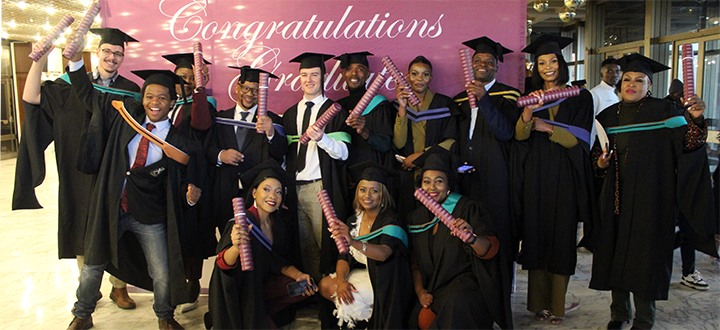News & Events
Unisa Midlands celebrates the resilience and achievements of graduates

Students after receiving their graduation certificates
The Unisa Midlands Region Autumn graduation ceremony was held on 20 and 21 June 2025 at the Sand du Plessis Theatre in Bloemfontein. A total of 1385 graduates were conferred their qualifications over four sessions.
The occasion was deeply emotional for many of the graduates and marked an exciting celebration for families, friends, and guests who gathered to honour their achievements. A significant milestone, the occasion was an opportunity to celebrate the hard work, resilience, and achievements of the students who completed their qualifications, many of whom faced great challenges.
In her welcome address, Professor Puleng LenkaBula, Unisa Principal and Vice-Chancellor, stated that the graduation ceremony was a time for students to celebrate their accomplishments and resilience, especially for those who might have struggled to complete their qualifications. “Resilience is the test and mark of commitment by those graduating during the autumn graduation,” she said. She highlighted that the university is playing a pivotal role in our country, on our continent, and in the world.
According to LenkaBula, education is not important for its own sake but for the societal transformation it brings because it contributes talent to build a strong, sustainable, thriving, prosperous, and peaceful society. She further noted that the toughest of journeys help create the best people – strong individuals who are resilient and willing to go out into society to remind us never to give up but always to have the determination, commitment, will and urgency to pursue our goals.
“Education invites you not to look down on anyone but to see your role as holding someone’s hand as you rise,” she said. “As a university, we are celebrating not only the success of our students, but also the academicians who invested their intellect, research, training, teaching, technical digital skills, and leadership skills to mentor and to hold the hands of students studying through Unisa.”
In conclusion, LenkaBula referred to the University of South Africa as the home of leaders and intellectuals who are committed to shaping the future of the country and the entire continent and said that she was elated to welcome everyone to the graduation. “It is never too late to enrol with Unisa,” she said.
Graduates in their own words:
Elzamin Jerononique Booyse from Delportshoop in the Northern Cape completed a Bachelor of Education in Early Childhood Development: Foundation Phase. “Losing a mother during my study journey, I did not think I would have the strength to complete my studies,” she said. Elzamin added that she had received funding to pay for her studies and had to persevere to ensure that her dream came true.

From left: Elzamin Jerononique Booyse, Marinus Aucamp, Stephanie Dekker and Edegware Samuel Okome
Marinus Aucamp obtained a Bachelor of Education in Intermediate Phase Cum Laude. Hailing from Kroonstad in the Free State, Marius is the first in his family to obtain a degree. “I realised that the environment should not prevent anyone from achieving their goals. I made it, and I will inspire my friends and family to study through Unisa,” he said.
Against all odds, Stephanie Dekker completed a Bachelor of Science specialising in Life Sciences Cum Laude. With tears in her eyes, she described what happened: “I was hospitalised due to illness. That is when I was on the brink of giving up.” Stephanie added that she appreciated the encouragement from Dr Xolani Makhoba, who was a pillar of strength during these difficult times. “It was a challenging journey,” said Stephanie, “but I persevered and made it. Indeed, all things are possible!”
Edegware Samuel Okome, from Namibia, obtained a Master of Laws (LLM) in Human Rights Law. He also holds a Bachelor of Laws (LLB) from Unisa. He said: “I drew motivation and inspiration from the former President Nelson Mandela, a prominent alumnus who completed his qualification at the University of South Africa. Although it was a bit challenging, I stayed focused to ensure I would achieve my goal,” he said.
The ceremony was graced by Northern Cape Premier, Dr Zamani Saul, along with other guests and dignitaries from provincial and local government in the Northern Cape and Free State provinces.
* By Thotogelo Masenya, Communication and Marketing Officer, Unisa Midlands Region
Publish date: 2025/07/17
